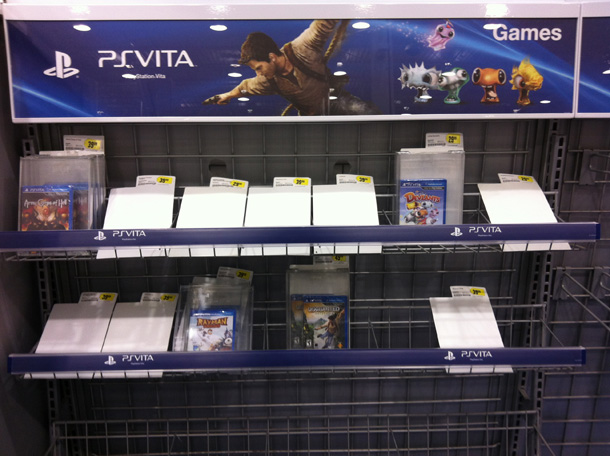
Those words usually accompany an end-of-season sale or used game clearance event. They’re usually associated with older releases, or specific retailer bins of games. They also don’t appear until well into the life span of a console.
But, at launch?
When the Playstation Vita neared release, Gamestop announced a terrific “Buy Two Get One Free” sale on the console’s software. Target, Best Buy and Amazon followed suit soon after, as did even the mom & pop stores. Was this a Sony initiative? Was it a domino effect of retailers? Whatever led to it, it worked. And it worked extremely well.
As fence-sitting consumers now had a monetarily-pleasing deal to push them over, they opened wallets and gobbled up games. The console sold out (especially the WiFi-only version) and the games followed. Racks emptied quickly at retailers, clearing out of consoles, games, and memory cards. In fact, the sale did so well to move consoles that Sony was happy to announce that the Vita had already reached 1.2 million units sold to consumers across all continents — ahead of the pace of the PSP, and at $250 as its starting price.
The promotion was a huge success. Not only did consoles sell, but software and accessories as well.
Though the practice is uncommon for platform launches, it’s a standard for other aspects of media. CD, DVD, and Blu Ray discs all release at sale prices, rocketing up the following weeks to “normal” MSRP. Video games typically release at or around MSRP prices and tend to go on sale a few weeks later, once early-adopters have gobbled up the initial run and spent more. The tapering of sales is dramatic; rarely will games maintain a consistent sales pace after the first week. To keep up, retailers drop the prices later on.
But, could a promotion like the Vita’s recent one be a strong example for creating a successful launch? Could retailers work with publishers to help curb the rate of piracy by pricing lower at launch, upselling with accessories and launch DLC?
It’ll be interesting to see how the Vita’s sales pace keeps up. It may be even more interesting to see how companies like Nintendo react with the launch of the WiiU in the Fall, up against Halo 4, Black Ops 2, Assassin’s Creed 3, and more. Sony’s precedent may have helped change a few business practices in the industry that are better for everyone involved.

2 Comments